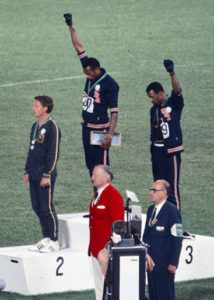By Victor Munoz
Sports Editor
Nearly half a century before Colin Kaepernick and the issue of NFL players kneeling during the National Anthem became a controversy that roiled the nation, two American athletes in 1968 waged their own silent protest during the playing of “The Star-Spangled Banner” during an awards ceremony at the Mexico City Olympics.
The photograph of the two athletes holding their arms high above their heads with black-gloved fists has become one of the most iconic images of the civil rights movement. Though criticized at the time for supposedly endorsing Black Power (the gestures were viewed by many as the Black Panther salute), one of those men, Tommie Smith, has written that it was intended more as a human right salute.

Tommie Smith (center) and John Carlos (right) at the 1968 Olympics.
Smith will be on campus Wednesday, Nov. 7 from 4-6 p.m., for “Silent Gesture: Athletics and Courageous Conscience,” part of the Presidential Distinguished Lecture series. The panel discussion will take place in the grand ballroom of the Loker Student Union. It is free but registration is required. For more information, visit csudh-distinguished-lecture.eventbrite.com.
The panel will also include retired NFL athlete Reggie Bush, UC Riverside athletic director Tamica Smith Jones, NFL reporter Steve Wyche, and current CSUDH volleyball player Esther Duru. Duru said she will represent the CSUDH athletic department, speaking about issues affecting athletics at the school, particularly students of color.
“We are going to be talking about athletics and if it’s a good place to talk about politics and if athletes should feel comfortable, [they will] bring that up,” Duru said. “The majority of our [students] are minorities. So, with what’s going on in our country, I feel it’s really important for us to be involved in this type of discussion,” Duru said.
Although Smith was a top-notch sprinter who set seven world records in his career and won the gold medal in the 200-meter sprint in 1968, his athletic accomplishments are often overshadowed by that iconic photo of him and his teammate John Carlos raising their fists during the medal ceremony.
What is mostly forgotten is that the upraised fists weren’t the only ways the two athletes expressed themselves. They also wore no shoes when accepting their medals, choosing to wear black socks, which represented black poverty. Smith wore a black scarf around his neck to represent black pride, while Carlos unzipped his tracksuit to show solidarity with American workers and wore beads for those who had been lynched and otherwise persecuted for their race
Set against the backdrop of an America that was at war in Vietnam and often it seemed, at war with itself in the streets, and in the wake of Martin Luther King Jr.’s assassination and growing unrest among African-Americans, Smith and Carlos decided to raise their fists in a show of solidarity.
“We were just human beings who saw a need to bring attention to the inequality in our country,” Smith said in a documentary of the 1968 Olympics. In 2015, he was quoted in the Indianapolis Star saying he and Carlos were concerned about “the lack of black assistant coaches. About how Muhammad Ali got stripped of his title. About the lack of access to good housing and our kids not being able to attend the top colleges…we decided to use our athleticism to be a voice for people who were voiceless.”
Fifty years later, and racial discrimination still exists, as does the backlash against those who speak out. Duru knows that personally. She said that before volleyball matches this year, she chose to look at the floor and not the U.S. flag. And on Nov. 2, before a game against UC San Diego, she took a knee.
Tonight, she will share the same stage as the man who, 50 years ago, made a statement that reverberated around the world and still echoes loudly today.

